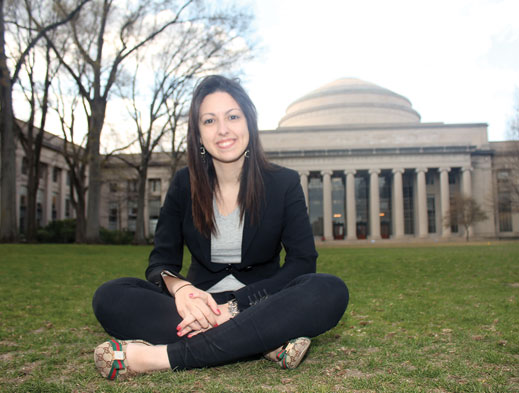Isabel “Bel” Pesce Mattos ’10
Bel Pesce’s MIT experience almost never began.

“I never heard about MIT until I was 17, and I thought you had to be American to apply,” says Pesce, who grew up in São Paulo, Brazil. “When I realized it was possible, I missed the SAT registration deadline. Everyone told me to give up.”
Pesce ignored the doubters, tracking down the only MIT alumnus in São Paulo at the time and showing up at his home—with a cardboard box full of her accomplishments.
“Everything I had ever done in my life, it was in that box,” she says. “He conducted the interview on the spot. We talked for hours.”
Despite missing the SAT deadline, Pesce went to the test site on the morning of the exam. When one student did not show, she took her place. Three months later, she was accepted to MIT.
“Perseverance can take you a long way,” she says. “MIT changed my life forever.”
Pesce, who lives in Silicon Valley, is currently head of business development at the tech startup Lemon, which offers a cloud-based virtual wallet that helps users electronically store and aggregate paper receipts and credit and debit cards. The company launched in October 2011, and its app has been downloaded more than two million times.
“We add a layer of intelligence to your wallet,” she says. “It’s a digital replica that you can access from anywhere.”
Before joining Lemon, Pesce worked as a product manager at Ooyala, a startup that provides online video technology products and services. She oversaw three engineering teams and watched the company grow from 20 employees to 200.
“I love to create products and services that make people’s lives easier and better,” she says. “Helping make things better—that’s how I define success.”
While at MIT, Pesce interned at Microsoft, where she was team leader for the Touchless webcam platform; Google, where she worked on Google Translate; and Deutsche Bank, where she gained experience in finance. In May 2012, she released a Portuguese-language e-book, A Menina do Vale (“The Girl from the Valley”), which chronicles her journey from São Paulo to Silicon Valley. The free, 84-page book was downloaded more than 500,000 times in its first month.
The TED (Technology, Entertainment, and Design) Conference named Pesce a 2012 fellow, and she presented at TEDGlobal in Edinburgh, Scotland, in June 2012.
Keep Reading
Most Popular
Large language models can do jaw-dropping things. But nobody knows exactly why.
And that's a problem. Figuring it out is one of the biggest scientific puzzles of our time and a crucial step towards controlling more powerful future models.
The problem with plug-in hybrids? Their drivers.
Plug-in hybrids are often sold as a transition to EVs, but new data from Europe shows we’re still underestimating the emissions they produce.
How scientists traced a mysterious covid case back to six toilets
When wastewater surveillance turns into a hunt for a single infected individual, the ethics get tricky.
Google DeepMind’s new generative model makes Super Mario–like games from scratch
Genie learns how to control games by watching hours and hours of video. It could help train next-gen robots too.
Stay connected
Get the latest updates from
MIT Technology Review
Discover special offers, top stories, upcoming events, and more.